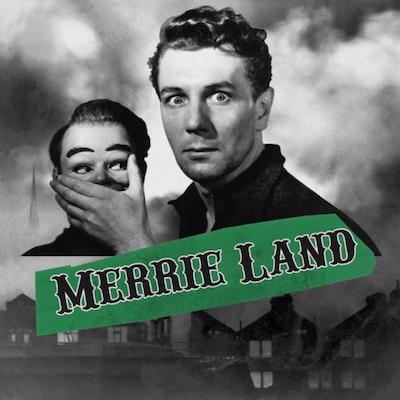
Secret Meeting score: 84
by Philip Moss
It’s 12 years since the ‘band with no name’ released their debut album, The Good, The Bad & The Queen – a record on which Damon Albarn stated that we’re ‘a stroppy little island of mixed up people’. But in a thoroughly extensive interview piece with John Harris in The Guardian last week, Albarn again opined – “We live on this stroppy little island, and we need to talk to each other. But have we not just spent the last couple of years going round in circles?”
And where the debut featured Kingdom of Doom – a macabre look at a country spiralling out of control, that referenced Blake’s damning poem, London – its follow up is ironically titled Merrie Land (note the old fashioned spelling, referring to the idolised image of England that, one might say, never really existed). So has anything really changed over the last dozen years? It seems Albarn & Co. think not.
Despite being best known for his usually cockney-centric themes, the 50-year-old used the train to carry out primary research in pubs and cafes across towns in the north. So while the title track’s narrator is pro-immigration and dreams of nationalised railways and rebuilt roads, the harsh reality is different: with a nod to Orwell’s Animal Farm, Albarn comments from the Brexit deadlands of Blackpool that it is the clowns who are cheered as they ‘roll into town’.
Despite his eye for social observation, Albarn has always been a writer whose work is seeped in melody and Merrie Land is no different. However, only Gun To The Head and closer, The Poison Tree, have what you may call a traditional chorus. Instead, the musicality falls somewhere between his solo album, Everyday Robots, and the theatrical soundtrack for Dr Dee, rather than The Good, The Bad & The Queen. As where producer, Danger Mouse, layered a hazy, cinematic sheen over the debut, Tony Visconti (David Bowie, T Rex, Morrissey) hasn’t interfered too much. The recordings, on the whole, bar a smattering of strings and ‘primary school’ recorders, are stripped back – the glitter instead replaced by a truer representation of the band’s natural live sound.
More so than on any of the debut, Afrobeat pioneer, Tony Allen, really comes to the fore on Nineteen Seventeen – locking in with Paul Simonon’s rambling bass lines, which groovily weave and tangle themselves throughout the entire record. The Great Fire is soaked in lowery organ and a tram ride along Blackpool promenade – ‘This tram is for Stargate, next stop is Uncle Tom’s Cabin’. While Lady Boston – set on the Lincolnshire coastline, where Albarn’s family descend from – is a gorgeous lamentation, backed by the haunting Cor Y Penrhyn Bethesda male choir.
The highlight, however, is perhaps the record’s most understated moment. Over Simon Tong’s delicate acoustic pickings, Ribbons is a song that goes straight into Albarn’s all time Hall of Fame.
Fellow nineties’ icon, Richard Ashcroft, recently stated that pop stars should avoid political projecture and focus solely on the music. But at a time when the not so merrie land has never been more divided, Albarn is a voice well worth listening to.





